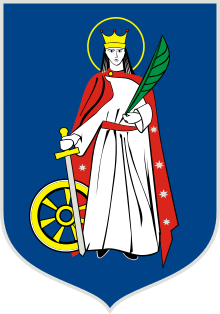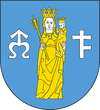Nowy Targ
Nowy Targ [ˈnɔvɨ ˈtark] (Latin: Novum Forum, Slovak: Nový Targ, German: Neumarkt, Yiddish: ניימארקט Naymarkt) is a town in southern Poland with 34,000 inhabitants (2006). It is the historical capital of the Podhale region. The town is situated in a valley beneath the Gorce Mountains featuring Gorce National Park established in 1981, at the confluence of rivers Biały and Czarny Dunajec. Administratively, it is in Nowy Targ County in the Lesser Poland Voivodeship. It was previously in Nowy Sącz Voivodeship (1975–1998).
Nowy Targ | |
|---|---|
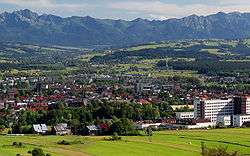 Center of Nowy Targ | |
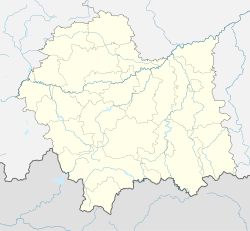 Nowy Targ  Nowy Targ | |
| Coordinates: 49°28′N 20°1′E | |
| Country | |
| Voivodeship | |
| County | Nowy Targ County |
| Gmina | Nowy Targ (urban gmina) |
| Established | 13th century |
| Town rights | 1346 |
| Government | |
| • Mayor | Grzegorz Watycha |
| Area | |
| • Total | 51.07 km2 (19.72 sq mi) |
| Highest elevation | 1,138 m (3,734 ft) |
| Lowest elevation | 585 m (1,919 ft) |
| Population (2006) | |
| • Total | 33,493 |
| • Density | 660/km2 (1,700/sq mi) |
| Time zone | UTC+1 (CET) |
| • Summer (DST) | UTC+2 (CEST) |
| Postal code | 34-400 to 34-403 |
| Area code(s) | +48 182 |
| Car plates | KNT |
| Website | http://www.nowytarg.pl |
Timeline of town history
- 1308 - Cistercians receive a land grant to form new settlements in the mountain region. A border settlement called Stare Cło (German: Altzoll, English: Old Customs Post) is founded soon thereafter.[1]
- 1346 - Nowy Targ founded by King Casimir the Great, based on the Stare Cło settlement, and granted significant internal autonomy based on Magdeburg law.[2]
- 1487 - King Casimir IV Jagiellon grants the rights to two annual festivals, and a weekly market fair on Thursdays. (The weekly open-air market continues to this day, now on Thursday and Saturday mornings.)
- 1533 - Nowy Targ obtains a statute requiring merchants to pass through the city when crossing the border.
- 1601 - Great fire destroys the parochial church and city records.
- 1656 - Swedish troops sack the town during the Deluge.
- 1710 - Another fire consumes 41 houses and the church.
- 1770 - Nowy Targ annexed by Austria (see: Partitions of Poland).
- 1886 - City Hall opens.
- 1914 - Vladimir Ilyich Lenin is arrested as a possible spy in southern Poland by Austrian authorities; he is jailed in Nowy Targ for approximately 12 days.[3]
- 1918 - The region rejoins the restored Poland after World War I.
- 1933 - Polish president Ignacy Mościcki visits.
- 1939 - German forces invade on 1 September, at approx. 16:30.
- 1941 - Resistance movement called the Tatra Confederation formed in Nowy Targ.
- 1942 - Jewish ghetto liquidated by Nazis on 30 August.
- 1945 - The Red Army forces out German occupants on 29 January. 4 Jewish Holocaust survivors who return to the town are being murdered by locals and the rest flee.
- 1966 - Born Wojciech Wiercioch, Polish writer.
- 1979 - Pope John Paul II visits Nowy Targ on 8 June, during his first pilgrimage to Poland.
Geography
Nowy Targ is located in the heart of Polish highlands at the altitude of 585–850 m above sea level (AMSL); latitude 49°28' N, longitude 20°01' E. Distance to the main urban agglomerations in Poland is: Warsaw – 376 km (234 mi), Łódź – 348 km (216 mi), Kraków – 84 km (52 mi), Gdańsk – 690 km (429 mi), Wrocław – 346 km (215 mi), Katowice – 157 km (98 mi), Kielce – 200 km (124 mi), Rzeszów – 214 km (133 mi), Szczecin – 727 km (452 mi), Białystok - 574 km (357 mi), Poznań – 475 km (295 mi), Częstochowa – 226 km (140 mi), Słupsk – 759 km (472 mi).
Climate
Due to its altitude, Nowy Targ is one of the coldest cities in Poland together with Suwałki and Zakopane. Winter usually lasts from late November to early April and between 90 and 110 days a year there is a snow cover. Air frost has been measured in every month of the year except for July. Summers are mild with occasional thunderstorms and high temperatures between 17 and 25 degrees Celsius. Hot days (over 30 °C (86 °F)) are rare, only occurring twice annually on average. Precipitation is heavy for Polish standards, varying between 900 millimetres at the airport and 1100 millimetres in Kowaniec to around 1350 millimetres on Bukowina Miejska, the highest part of the city. The growing season equally varies between on average 150 days on Bukowina Miejska to around 200 days in the lower parts of the city. Nowy Targ is in the AHS Heat Zones 1-2 and USDA Hardiness Zone 4a to 5b, depending on the location.
According to the Köppen climate classification, Nowy Targ straddles the border of the Warm Summer Continental (Dfb) and Subarctic (Dfc) climates, with most of the city falling in the Dfb group. The Dfc climate is only found above 800 metres of elevation within Nowy Targ.
| Climate data for Nowy Targ - Kowaniec, Poland (640 m) | |||||||||||||
|---|---|---|---|---|---|---|---|---|---|---|---|---|---|
| Month | Jan | Feb | Mar | Apr | May | Jun | Jul | Aug | Sep | Oct | Nov | Dec | Year |
| Record high °C (°F) | 15.5 (59.9) |
17.3 (63.1) |
20.8 (69.4) |
26.5 (79.7) |
30.1 (86.2) |
32.8 (91.0) |
33.3 (91.9) |
34.0 (93.2) |
29.8 (85.6) |
25.7 (78.3) |
22.3 (72.1) |
14.2 (57.6) |
34.0 (93.2) |
| Average high °C (°F) | −2.0 (28.4) |
−1.3 (29.7) |
4.9 (40.8) |
11.8 (53.2) |
17.1 (62.8) |
20.1 (68.2) |
20.9 (69.6) |
20.5 (68.9) |
18.0 (64.4) |
11.6 (52.9) |
3.8 (38.8) |
−0.1 (31.8) |
10.4 (50.7) |
| Daily mean °C (°F) | −5.3 (22.5) |
−4.8 (23.4) |
−0.4 (31.3) |
5.4 (41.7) |
11.3 (52.3) |
13.8 (56.8) |
14.7 (58.5) |
14.3 (57.7) |
10.7 (51.3) |
5.6 (42.1) |
0.0 (32.0) |
−3.5 (25.7) |
5.1 (41.2) |
| Average low °C (°F) | −9.0 (15.8) |
−8.7 (16.3) |
−6.0 (21.2) |
−1.2 (29.8) |
5.5 (41.9) |
7.8 (46.0) |
9.0 (48.2) |
7.9 (46.2) |
4.1 (39.4) |
0.2 (32.4) |
−3.5 (25.7) |
−6.7 (19.9) |
−0.1 (31.8) |
| Record low °C (°F) | −37.4 (−35.3) |
−34.1 (−29.4) |
−25.6 (−14.1) |
−13.5 (7.7) |
−6.1 (21.0) |
−3.5 (25.7) |
0.9 (33.6) |
−2.2 (28.0) |
−5.8 (21.6) |
−14.1 (6.6) |
−22.7 (−8.9) |
−28.9 (−20.0) |
−37.4 (−35.3) |
| Average precipitation mm (inches) | 55 (2.2) |
53 (2.1) |
60 (2.4) |
85 (3.3) |
115 (4.5) |
147 (5.8) |
162 (6.4) |
126 (5.0) |
93 (3.7) |
67 (2.6) |
60 (2.4) |
55 (2.2) |
1,078 (42.4) |
| Mean monthly sunshine hours | 68 | 85 | 112 | 134 | 175 | 167 | 159 | 156 | 125 | 118 | 81 | 58 | 1,438 |
| Source: IMGW | |||||||||||||
Culture

- City Cultural Center (Miejski Ośrodek Kultury)
- Youth Cultural Center (Młodzieżowy Dom Kultury)
- The Jatka Gallery (Galeria Jatki)
Museums
- Museum of Podhale (Muzeum Podhalańskie PTTK)
Cinemas
Architecture

Wooden church overseeing the city cemetery. Its origins date to the 15th century, although local legends describe it as founded in 1219.
St. Anna Church
Initially built in a gothic style, it was later repaired and rebuilt featuring, among others, a baroque altar piece and paintings, a rococo pulpit, and 18th-century organ and bell tower.
St. Catherine Church
Dedicated to St. Catherine of Alexandria, the church was built in 1346 by King Casimir the Great. It is the oldest existing church of the Podhale region.
The church has been damaged by numerous fires and military attacks, and subsequently rebuilt and renovated. The interior retains its baroque character, especially in the altar and side chapels, although numerous pieces are replicas of wooden originals lost to fire. A painting of St. Catherine from 1892 dominates the main altar.
Sport
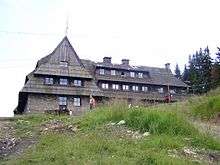
Ice hockey
Floorball
- KS Szarotka Nowy Targ
- KS Górale Nowy Targ
The Conservation of Nature
Nature reserves
- Bor na Czerwonem - a reserve in Nowy Targ where the protected Drosera rotundifolia, Mountain Pine and Black Grouse grow.
International relations
Twin towns — Sister cities
Nowy Targ is twinned with:
References
- Notes
- Mieczysław Adamczyk, et al. Dzieje miasta Nowego Targu (History of the City of Nowy Targ), p.35, Podhalańskie Towarzystwo Przyjaciół Nauk: 1991.
- Mieczysław Adamczyk, et al., op. cit. Quoted after: J. Rafacz, Dzieje i ustrój Podhala Nowotarskiego za czasów dawnej Rzeczypospolitej,, p. 161, Warszawa: 1931.
- Krupskaya, Nadezhda. Мой муж - Владимир Ленин [My husband - Vladimir Lenin] (in Russian). Издательство Алгоритм. ISBN 5040661096.
- "Oficiálne stránky mesta Kežmarok". kezmarok.sk. Archived from the original on 1 March 2010. Retrieved 8 February 2010.
External links
| Wikimedia Commons has media related to Nowy Targ. |
- Nowy Targ - official homepage
- Nowy Targ Holocaust Memorial book (Hebrew, Yiddish and English)
- Jewish Community in Nowy Targ on Virtual Shtetl
- English translation of the Nowy Targ Yizkor Book
- Nice photos from Nowy Targ
